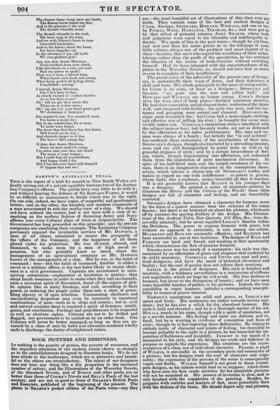BARTON'S AUSTRALIAN TRIAL.
THIS is the report of a trial for assault in New South Wales, evi- dently arising out of a private squabble between two of the Austra- lian Company's officers. The public have very little to do with it ; and without hearing the defence of Sir EDWARD PARRY, it would be as difficult as unnecessary to decide which was in the right. On one side; indeed, we have copies of respectful and gentlemanly letters; and on the other, the haughty and insolent commands of a man accustomed to rule the motley crew of a ship. We should not have noticed the matter, had it not been with a view of re- marking on the modern fashion of thrusting Army and Navy officers into every Colonial place of trust or responsibility. The Government has long proceeded on this principle; and the private companies are emulating their example. The Australian Company previously enjoyed the invaluable services of Mr. DAWSON, a man of all others calculated to insure the prosperity of the .'affairs of the Company, and the happiness of all those placed under his protection. He was ill-used, abused, and dismissed, to make • room for a man of high naval re- putation, but who probably knew as much about the management of an agricultural company as Mr. DAWSON knows of the management of a ship. But he was in the habit of command : true—but the habit of command, familiar to either a naval or a military officer, is the last habit likely to secure obedi- ence in a civil government. Captains are accustomed to unin- quiring submission—explanation or hesitation is mutiny : they adopt harsh measures in order to make what they call an example, raise a universal spirit of discontent, dread all the organs of pub- lic opinion like so many fireships, and end, according to their power, in reducing the people under them into a state of grum- bling slavery or of open rebellion. Unreasoning obedience and unconciliating despotism may even be necessary in unnatural combinations of men—such as in ships and armies; but in civil and natural societies there is required a spirit of firmness, intelli- gence, and conciliation. Feelings and prejudices are to be respected as well as absolute rights. Citizens are not to be drilled and Bogged, nor government to be carried on by an order-book. Our Colonies will never be better managed, as long as they are go- verned by a class of men by habit and education rendered wholly unfit to discharge the duties of enlightened rulers.



























 Previous page
Previous page